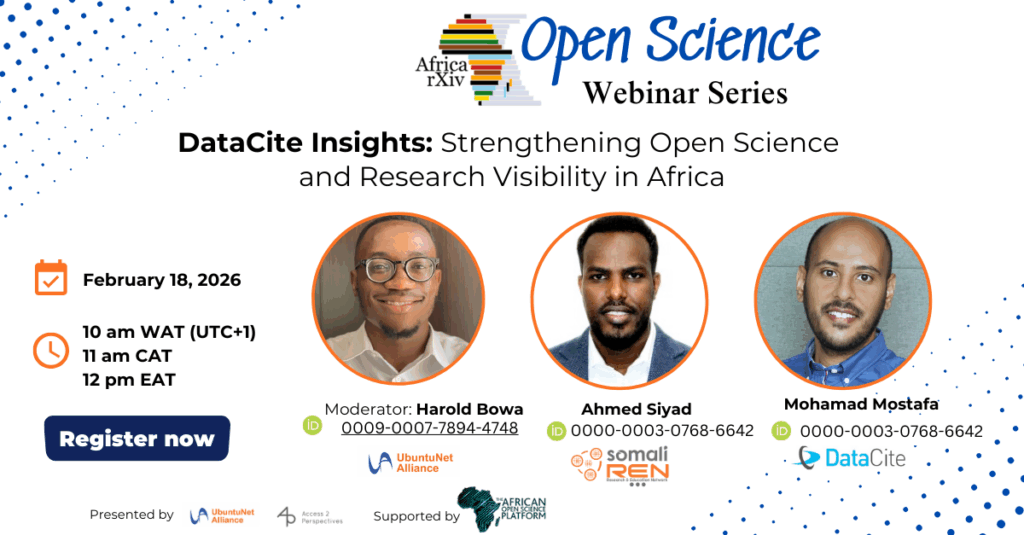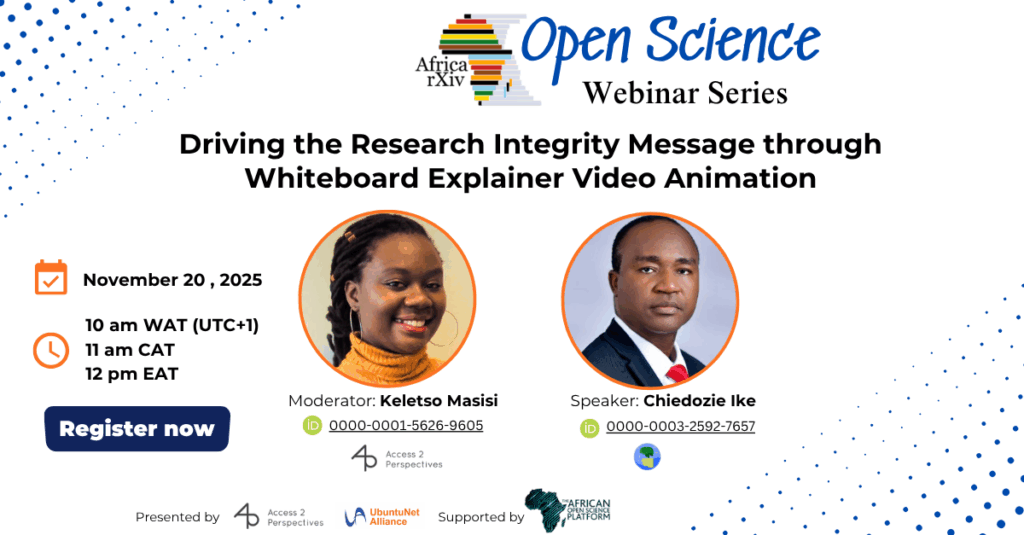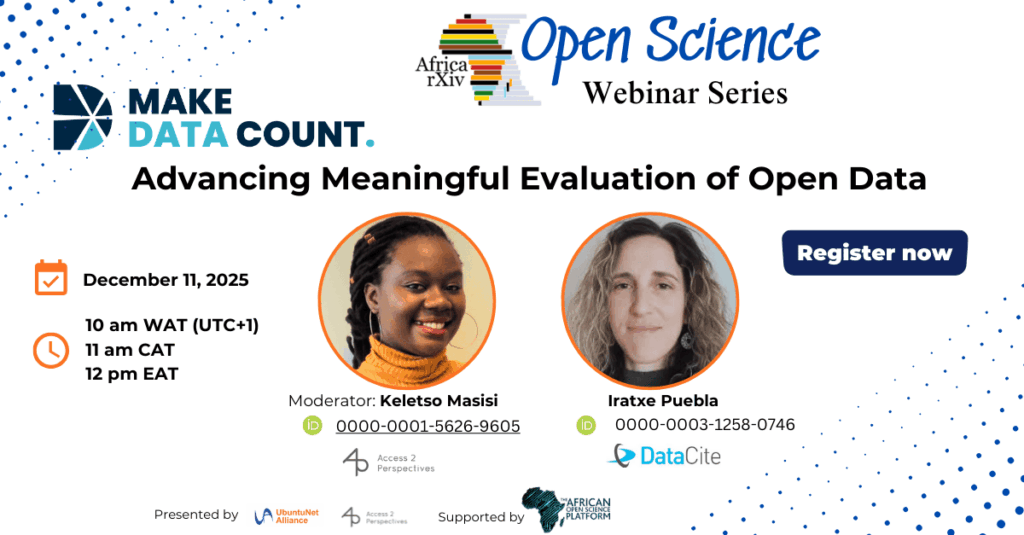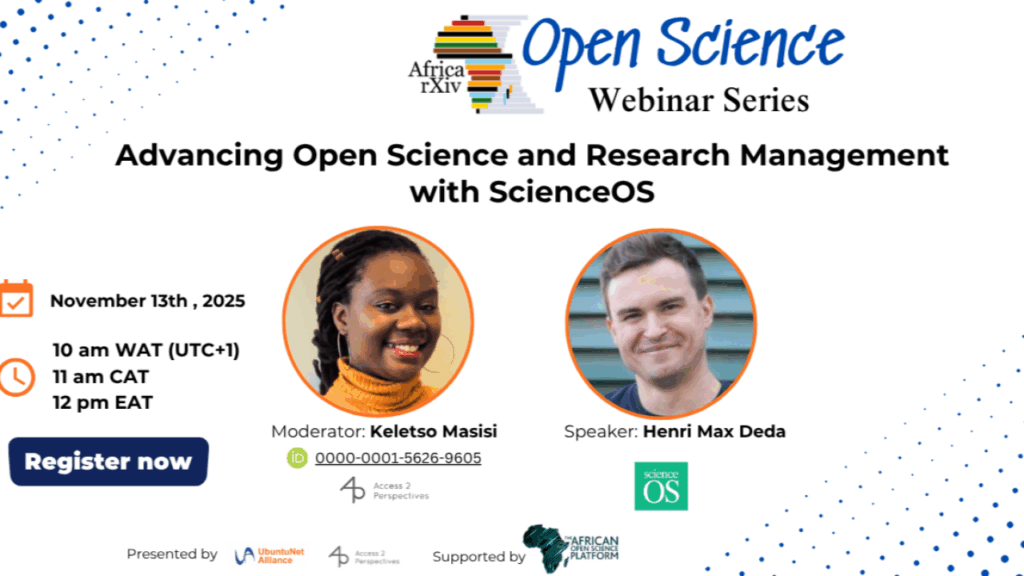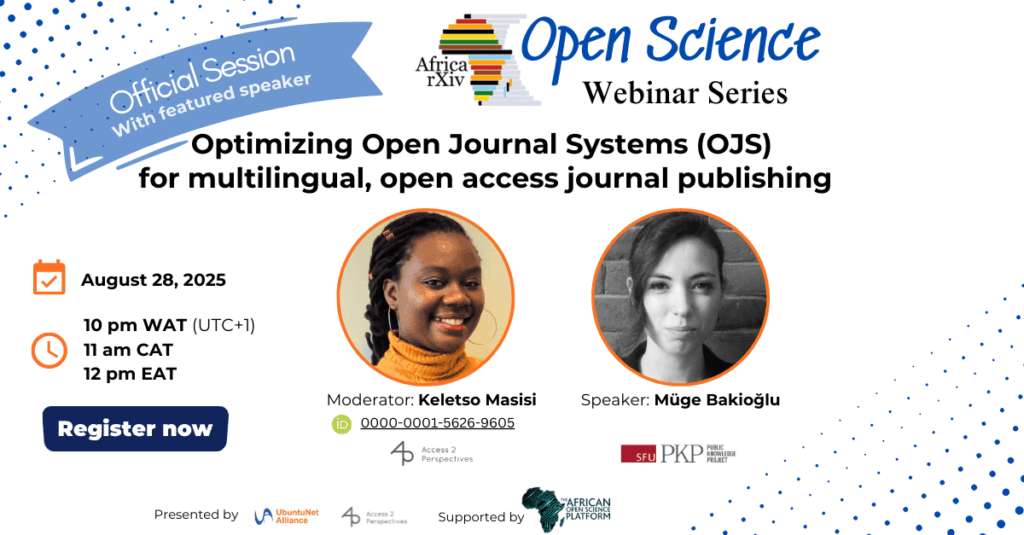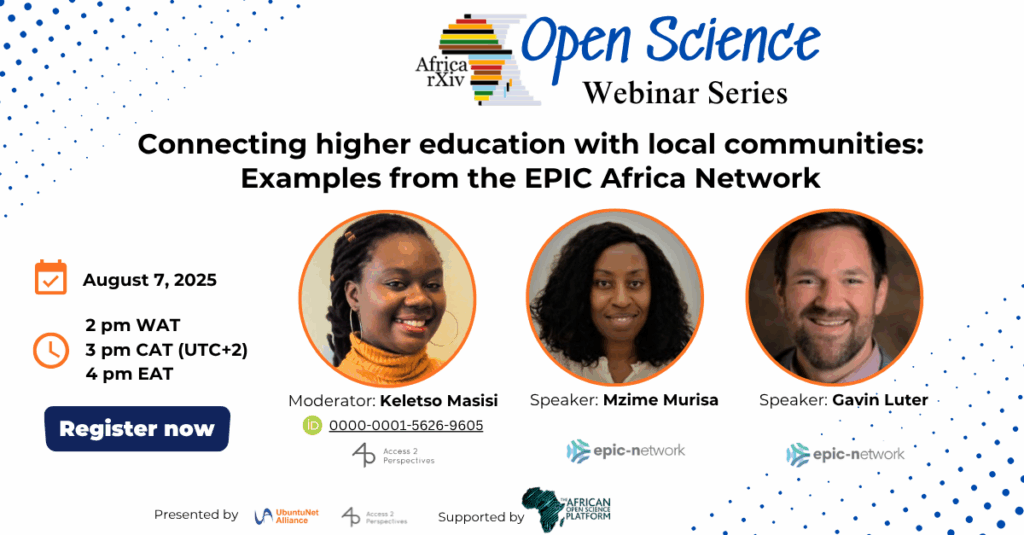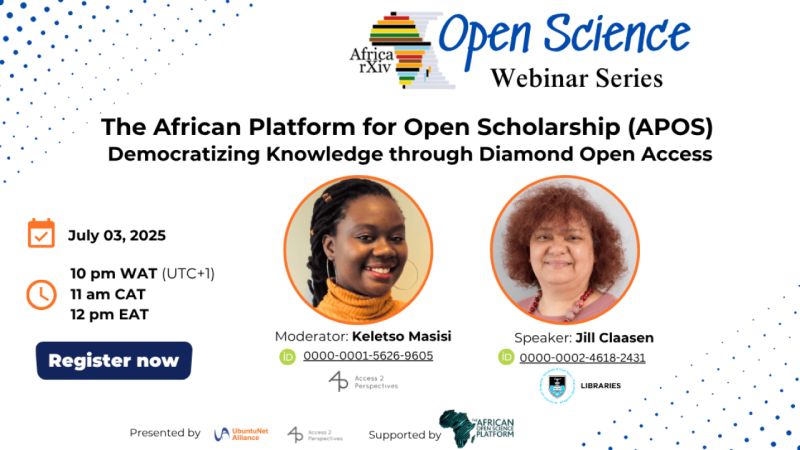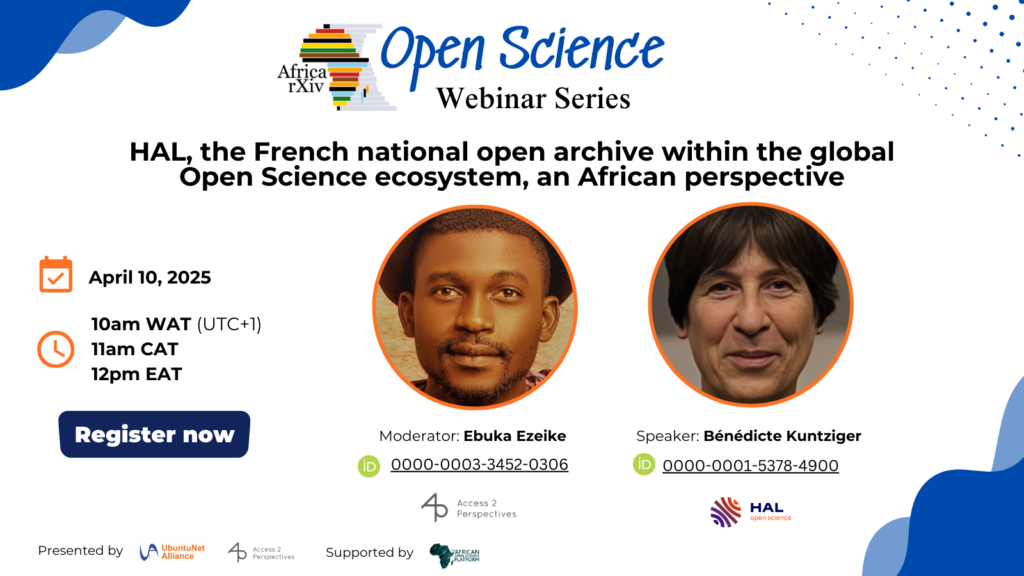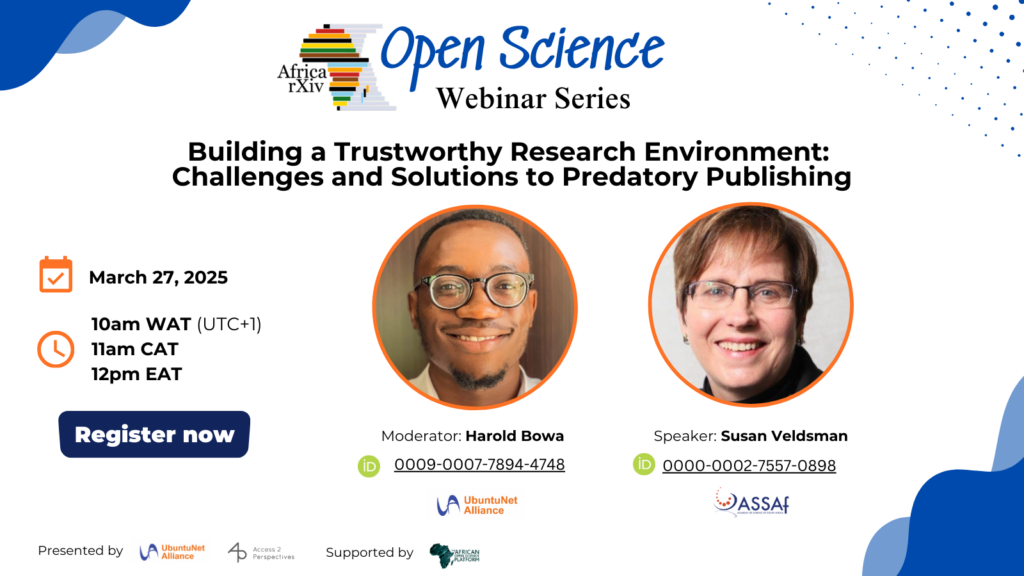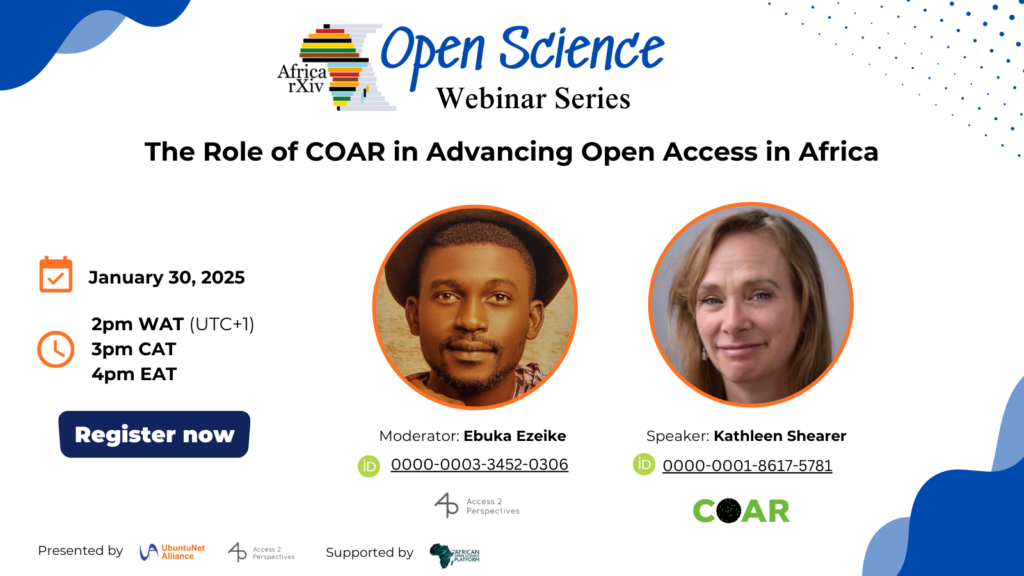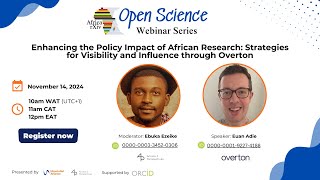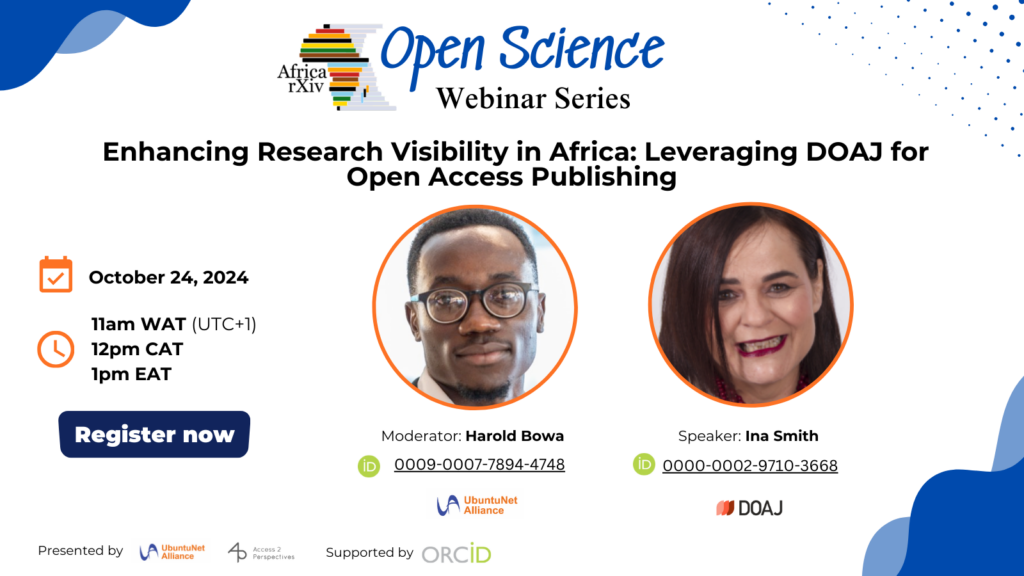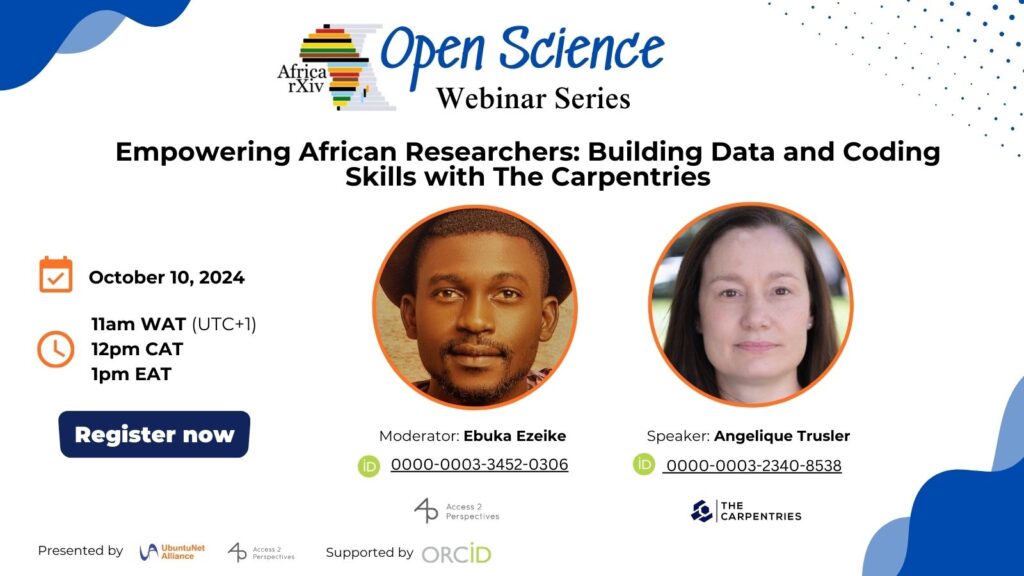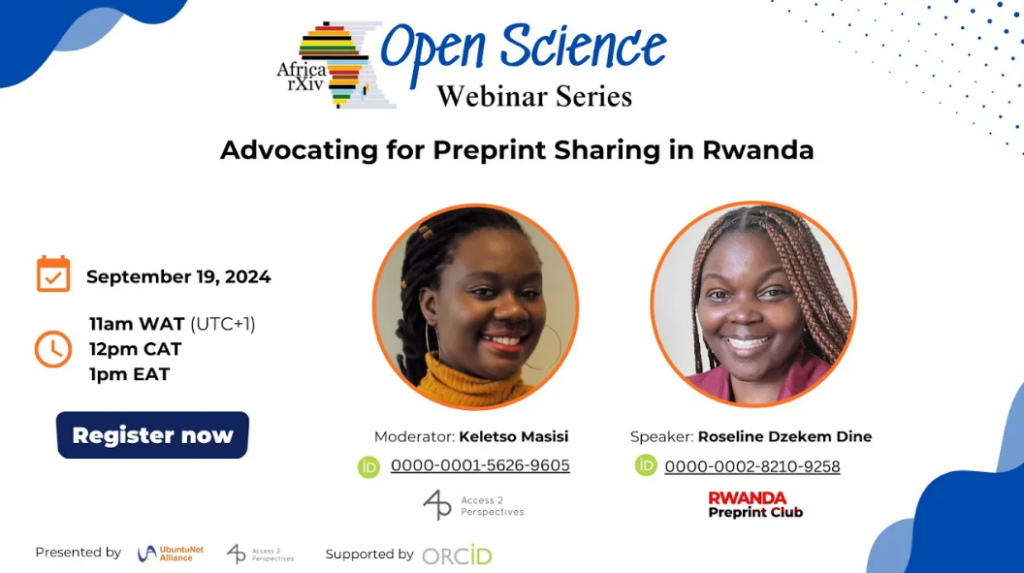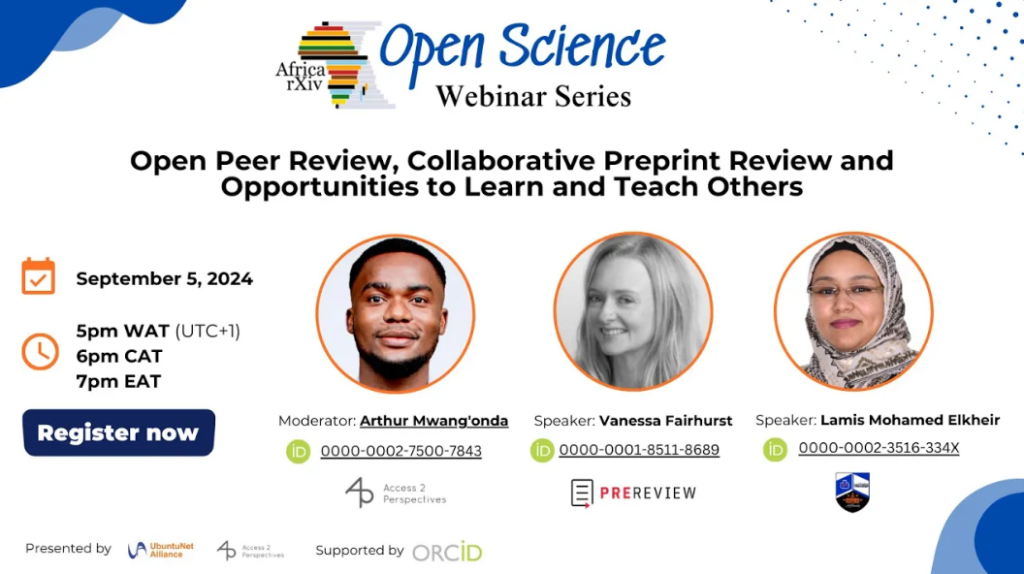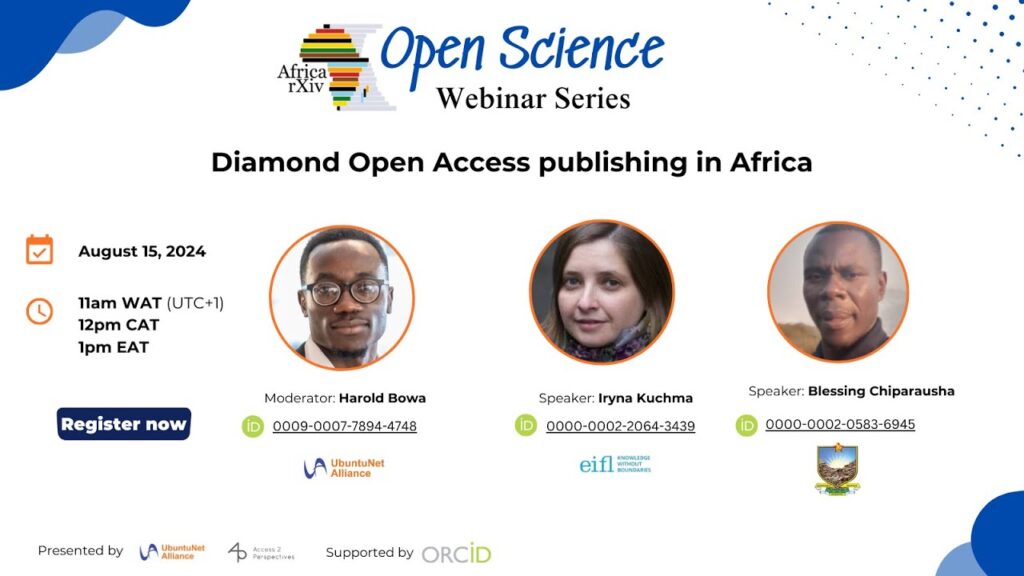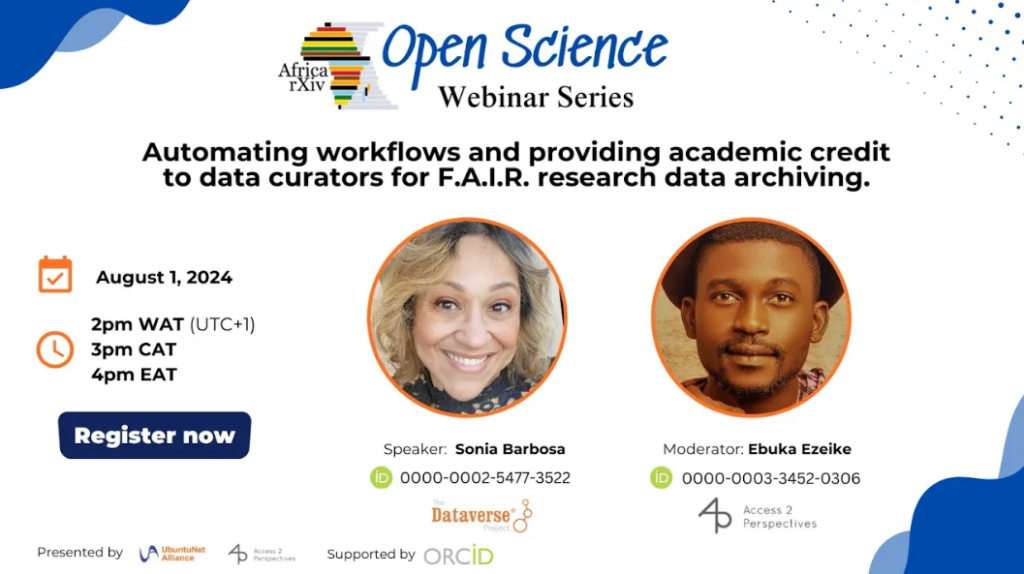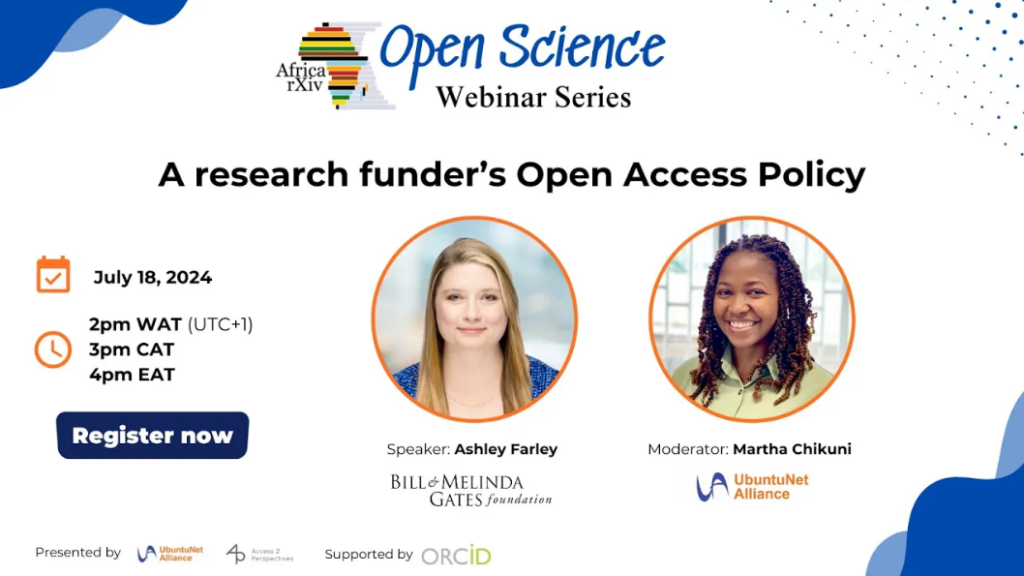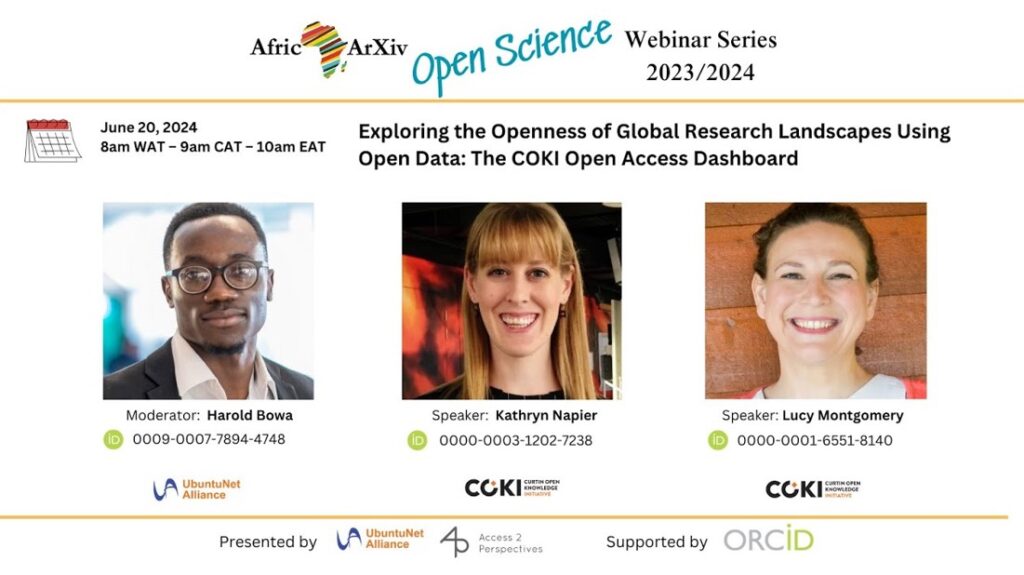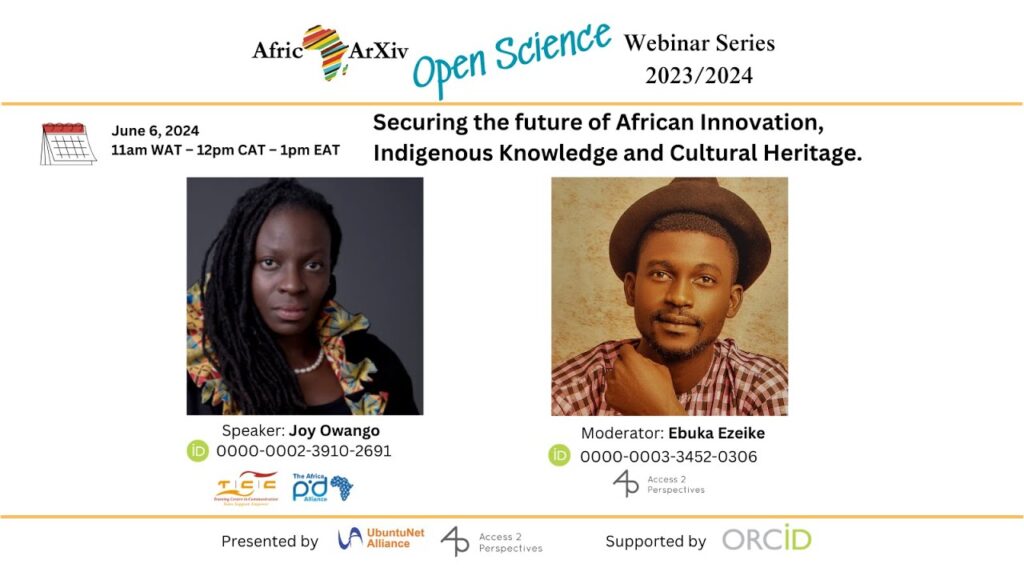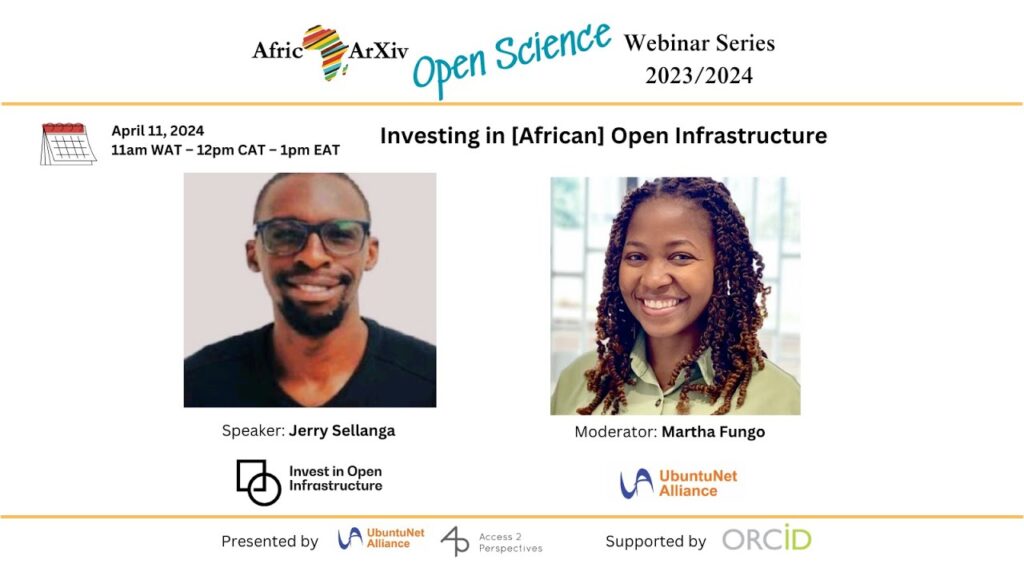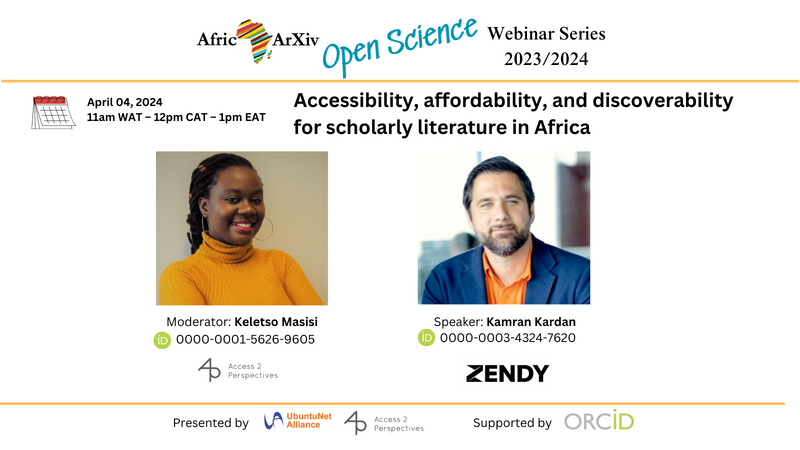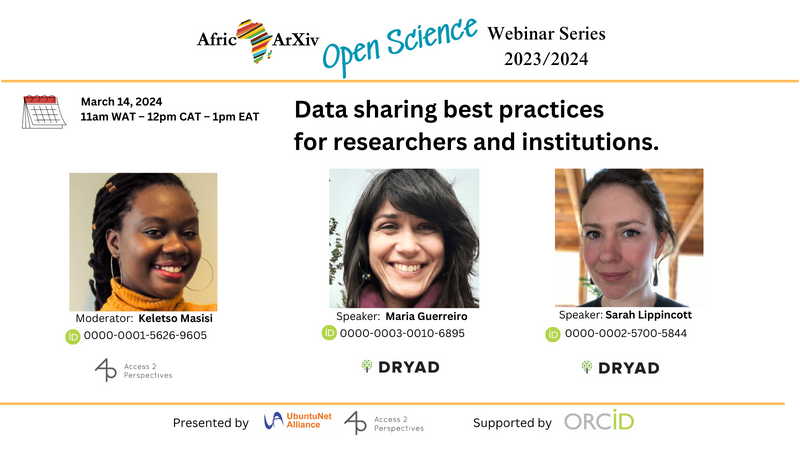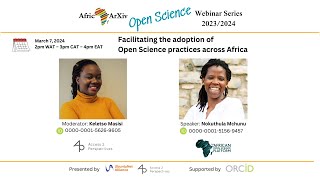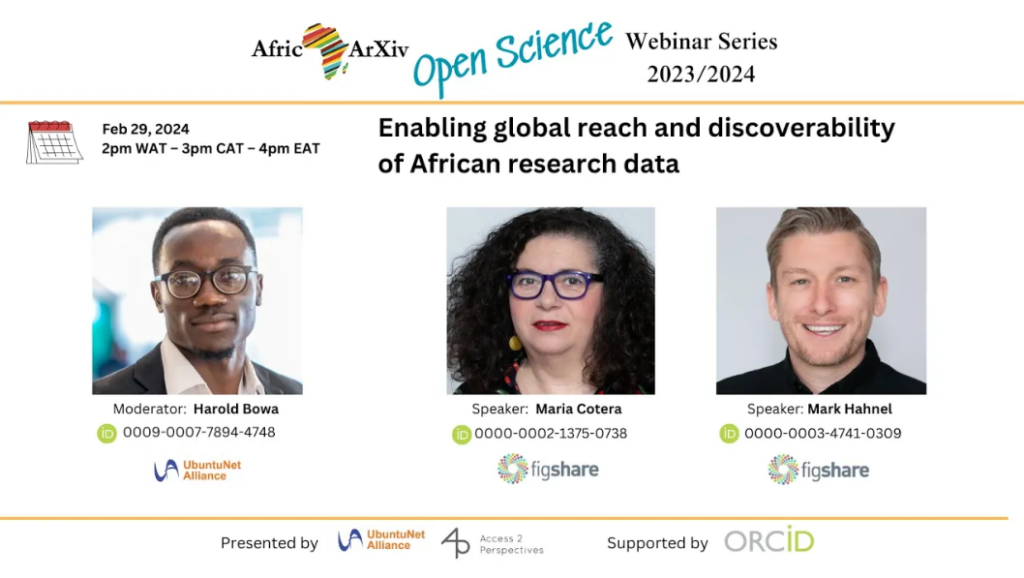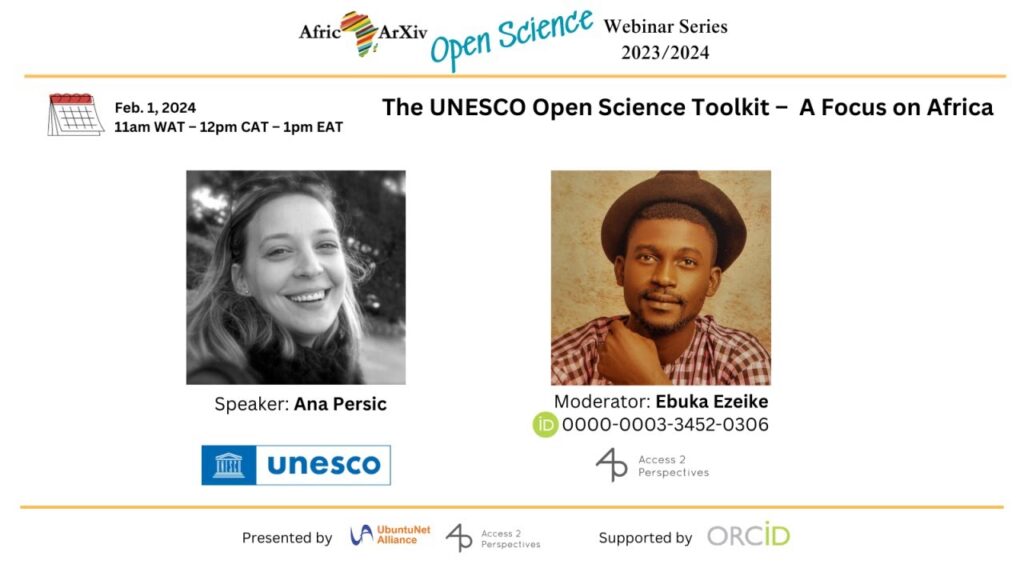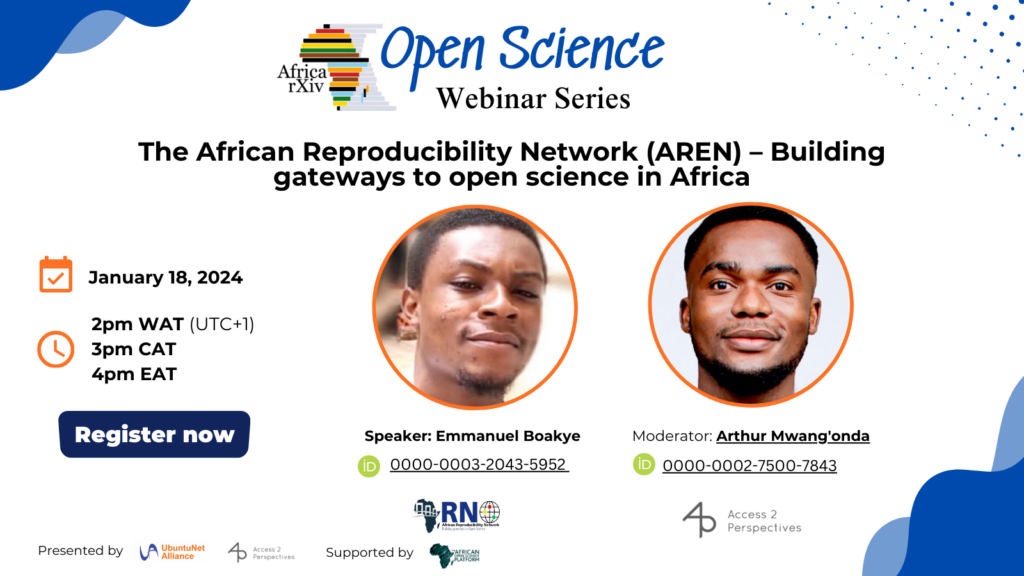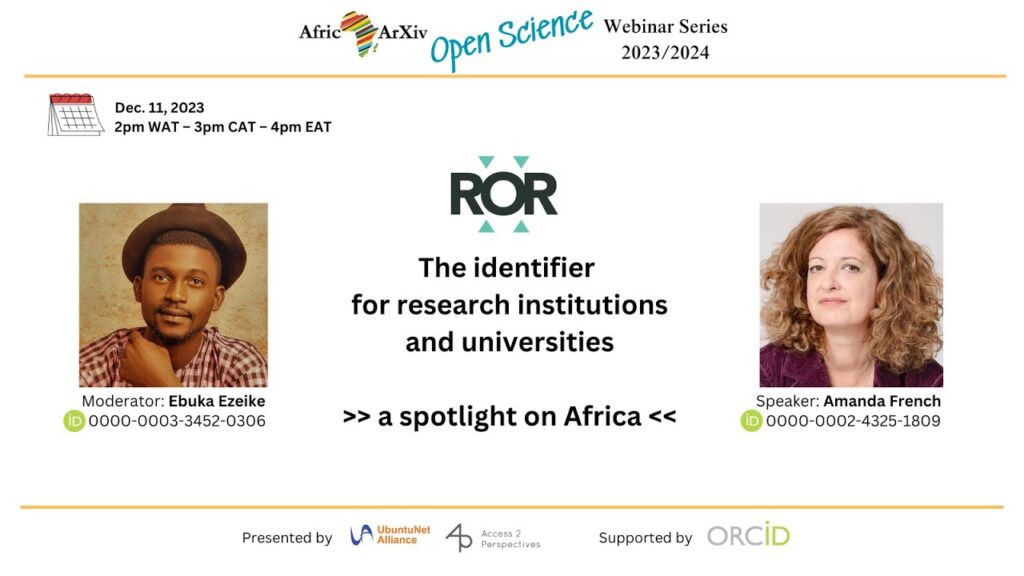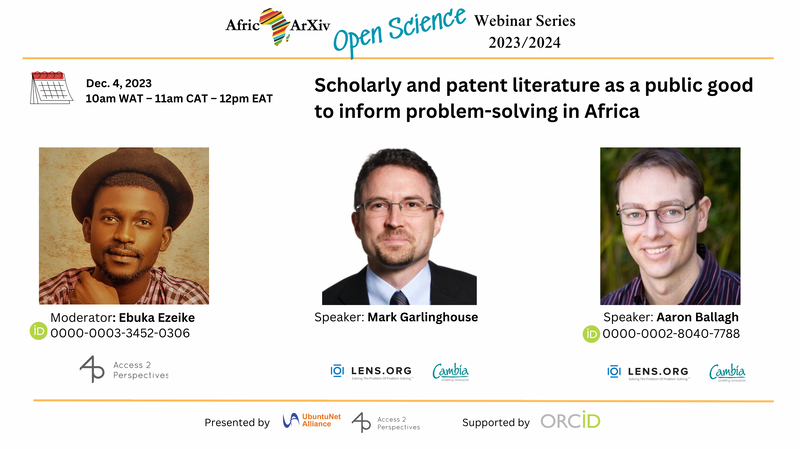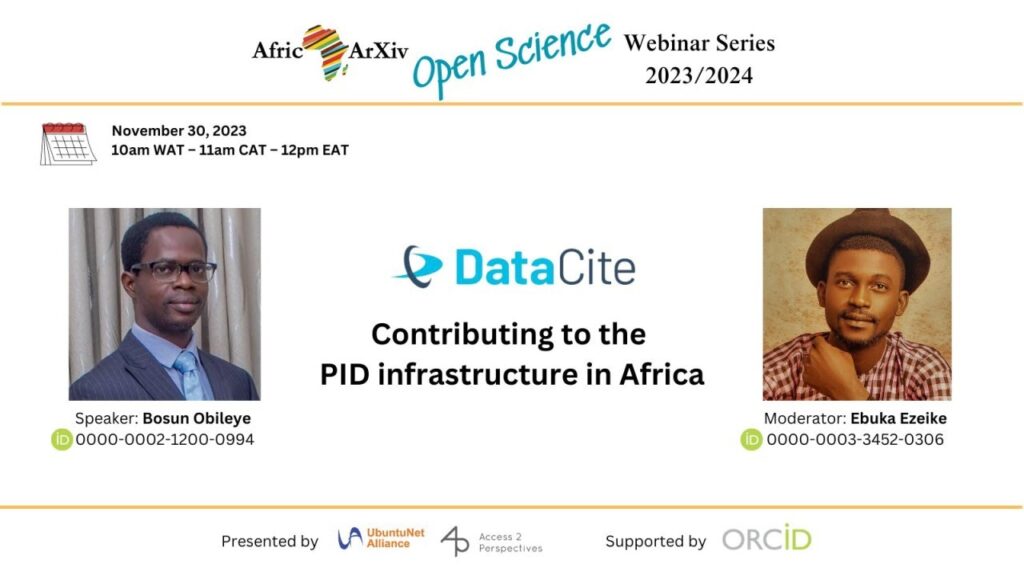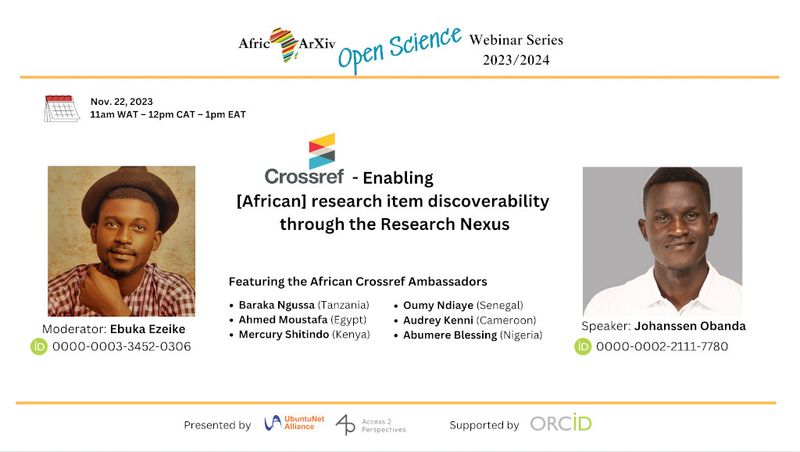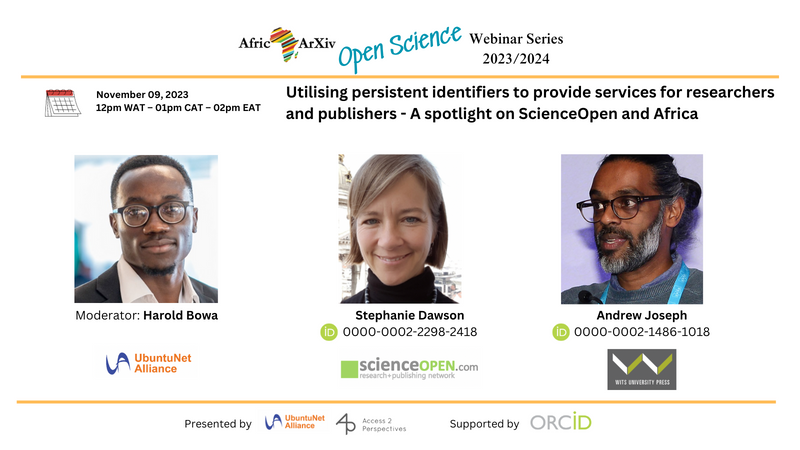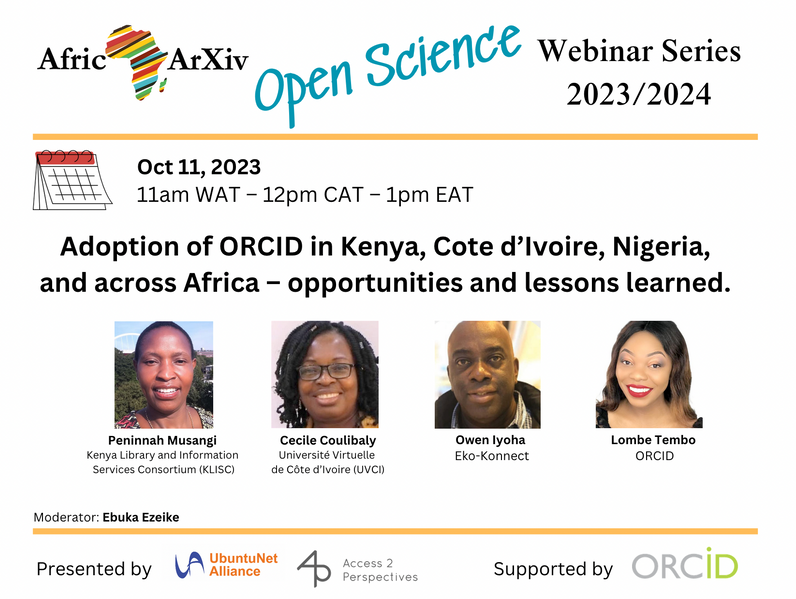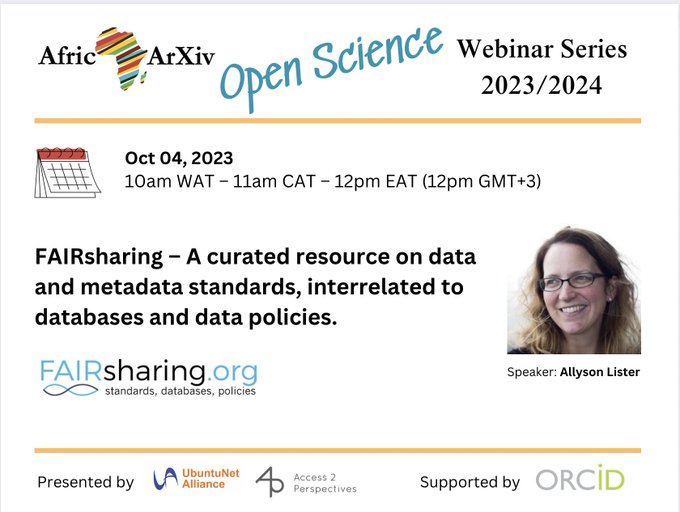
Through an engaging webinar series, we explore with you the transformative impact of Open Science practices on the discoverability of African research. We delve into the significance of Persistent Identifiers (PIDs) and how they facilitate interoperability across digital services presented here.
Join us on this transformative journey to amplify the visibility of African research and foster a more interconnected and efficient scholarly ecosystem. Let’s pave the way for a future where African contributions are prominently featured and celebrated globally.
Upcoming webinar sessions
- 9th April, 2026: EAJNS – The journey of a Diamond OA Journal in Kenya
- 23rd April, 2026 : AJOL
- date tbc: Preprint servers and journals: Rivals or allies?
- date tbc: Artificial Intelligence in Scholarly Writing and Publishing in Africa
- date tbc: Enabling Open Science Through Research Code and Research Software in (South) Africa
- date tbc: Comparing Tanzanian forest science (in-)visibility in selected bibliographic databases
Objectives and Target Audience
Designed for African researchers, librarians, journal editors, and research managers by providing valuable insights into the functionalities of digital scholarly tools and persistent identifiers. Our primary goals are to significantly enhance the discoverability of African research on a global scale and streamline scholarly workflows for increased efficiency.
Why Attend?
- Learn practical strategies for adopting digital scholarly tools and PIDs in your research workflows, for literature search, scholarly publishing, and effective research dissemination.
- Gain in-depth knowledge about the role of PIDs in scholarly communication.
- Contribute to the global visibility and impact of African research.
Key Focus Areas
- Open Science practices and progress across African research communities.
- Increasing discoverability of African research outcomes and accomplishments.
- Low- and no-cost scholarly publishing by harnessing Open Science and Open Access best practices and service providers.
- Responsible use and analysis of bibliometrics to increase the visibility and reputation of African research institutions.
- The significance of Persistent Identifiers (PIDs) and how they facilitate interoperability across digital services.
- Open Researcher and Contributor ID – ORCID: Understanding the role of ORCID in uniquely identifying and connecting individual researchers to their contributions, fostering collaboration and recognition.
- Research Organisation Registry – ROR: Exploring the significance of ROR in assigning PIDs to research institutions, contributing to a more structured and interconnected research landscape.
- Digital Object Identifier – DOI: Unraveling the benefits of DOIs in uniquely identifying and ensuring the persistent accessibility of diverse digital objects and scholarly outputs. DOIs are similar to Handles and Arks.
Watch the recordings
All past session recordings are available on YouTube, and the slides are archived in our repository at https://africarxiv.ubuntunet.net/handle/1/20.
Watch the session recordings
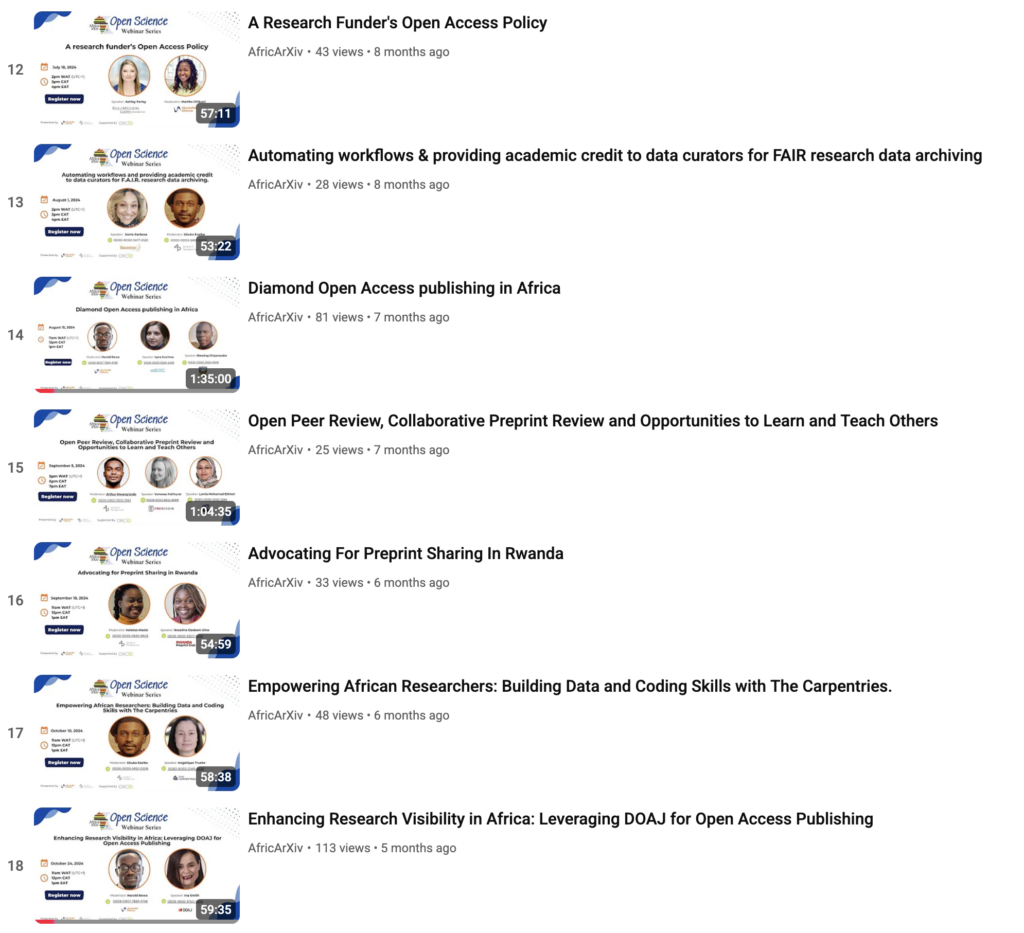
Look up the session slides
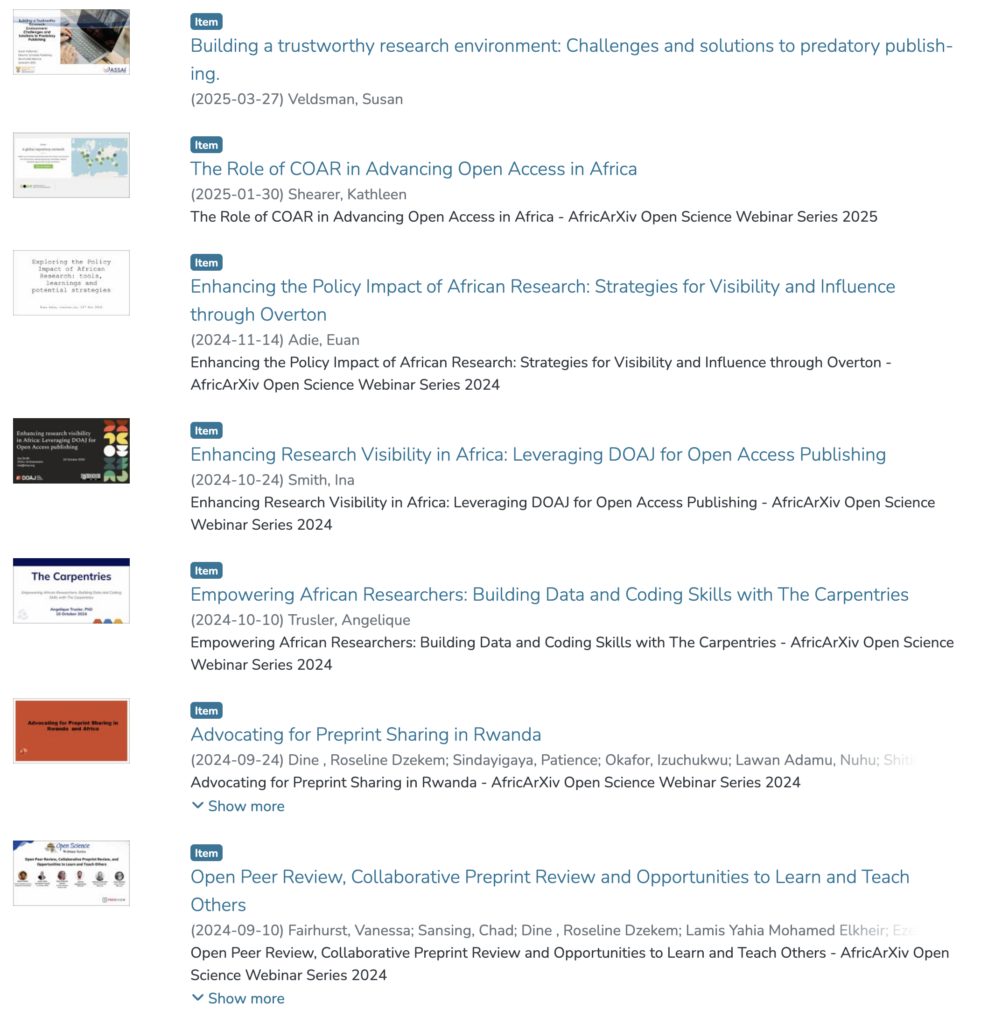
Previous webinar sessions
- DataCite Insights, Strengthening Open Science and Research Visibility in AfricaOn February 18th, 2026, we held an insightful session with Mohamad Mostafa on how DataCite is advancing Open Science and boosting research visibility across Africa, with a use case presented by Ahmed Siyad (CEO, SomaliREN). The session was moderated by Harold Bowa. Slides are available at https://africarxiv.ubuntunet.net/handle/1/10749The session recording will be uploaded in due course.… Read more: DataCite Insights, Strengthening Open Science and Research Visibility in Africa
- Driving the Research Integrity Message through Whiteboard Explainer Video AnimationMany educators lack formal training in pedagogy. As a result, they often depend too heavily on traditional lectures and slide presentations that are overcrowded with information. This situation is sometimes referred to as “death by PowerPoint,” leading to cognitive overload and poor information retention among students.In this Webinar, Dr. Chiedozie Ike focused on the power… Read more: Driving the Research Integrity Message through Whiteboard Explainer Video Animation
- Make Data Count: Advancing meaningful evaluation of open dataDespite advances in open data, crucial questions remain about how data are being used and for what purposes. The Make Data Count initiative is driving progress on this front by developing tools and community practices that help better measure, understand, and recognize the use and impact of data as a key research output. In this… Read more: Make Data Count: Advancing meaningful evaluation of open data
- Advancing Open Science and Research Management with scienceOSScienceOS is the AI research agent that streamlines your workflows with access to over 225 million papers. It offers answers with in-text citations, uploading PDFs, and a built-in reference manager that lets you chat with thousands of full-text papers and create shared libraries. Advanced algorithms prioritize reliable sources, while chat-based interactions make navigating knowledge feel like talking with a colleague. Additional tools, such as citation network, support your literature research.
- UbuntuNet Alliance Webinar: Crossref Services for Librarians and Journal EditorsUbuntuNet Alliance is pleased to invite librarians and journal editors across Eastern and Southern Africa to an insightful webinar titled “Crossref Services for Librarians and Journal Editors.”
- Optimizing Open Journal Systems (OJS) for multilingual, open access journal publishing in AfricaJoin us on Thu, Aug 28, 2025, at 11 am CAT for a presentation by Müge Bakioğlu from the Public Knowledge Project to learn how to make the most of Open Journal Systems (OJS) with core features for multilingual and #OpenAccess publishing, plugins, and integrations that support #persistentidentifiers, long-term preservation, and streamlined workflows.
- Connecting Higher Education with Local Communities: Examples from the EPIC Africa NetworkThe EPIC Model is designed to be flexible and context-sensitive, allowing universities and local governments to co-create projects that address local priorities. In African contexts, this means…
- Democratizing Knowledge through Diamond Open AccessThe African Platform for Open Scholarship (APOS) fosters open access and global knowledge exchange. Hosted by the University of Cape Town (UCT), APOS empowers African researchers to take ownership of their scholarly content, promoting local research for societal development.
- HAL, the French national open archive within the global Open Science ecosystem, an African perspective We hosted Bénédicte Kuntziger as our guest in this session. Bénédicte is the support, trainer, and community engagement lead at HAL and she guided attendees through the following: Watch the recording The slides are available at Speaker’s Profile: Bénédicte Kuntziger Bénédicte Kuntziger has been a documentation engineer at CNRS for over 30 years. She first… Read more: HAL, the French national open archive within the global Open Science ecosystem, an African perspective
- Building a Trustworthy Research Environment: Challenges and Solutions to Predatory PublishingSusan Veldsman, the Director of the Scholarly Publication Unit at the Academy of Science of South Africa (ASSAf), spoke on the challenges and solutions to predatory publishing and how we can build a trustworthy research environment. During her presentation, she gave an introduction to what predatory journals are, how predatory publishing challenges Open Science and… Read more: Building a Trustworthy Research Environment: Challenges and Solutions to Predatory Publishing
- The Role of COAR in Advancing Open Access in AfricaThe Executive Director of the Confederation of Open Access Repositories (COAR), Kathleen Shearer, shared insights on how COAR supports open access to research in Africa and ways African researchers and institutions can make their work more visible worldwide. Watch the recording The slides are available at https://africarxiv.ubuntunet.net/handle/1/1817 Speaker’s profile Kathleen Shearer Kathleen Shearer is the… Read more: The Role of COAR in Advancing Open Access in Africa
- From Research to Real-World Policy: Lessons from Overton’s JourneyHow does academic research find its way into government policies, global reports, or public debates? That question sits at the heart of Overton — the world’s largest database of public policy documents. Euan Adie, Overton’s founder, shared the platform’s origin story, its unique role in mapping research-policy connections, and valuable advice for researchers — especially in Africa — aiming to boost their policy impact.
- Enhancing Research Visibility in Africa: Leveraging DOAJ for Open Access PublishingIna Smith, the Planning Manager, Scholarly Publishing Unit, Academy of Science of South Africa (ASSAf), & DOAJ Ambassador for Southern Africa, gave an in-depth presentation on how African researchers and journals can increase their visibility and impact through DOAJ. Watch the recording The slides are available at https://africarxiv.ubuntunet.net/handle/1/1704 Related resources DOAJ Website: https://doaj.org/DOAJ Guide to… Read more: Enhancing Research Visibility in Africa: Leveraging DOAJ for Open Access Publishing
- Empowering African Researchers: Building Data and Coding Skills with The CarpentriesAngelique Trusler, community manager at The Carpentries in Africa, shared insights on how researchers can start their data and coding skills journey. Attendees learned fundamental coding techniques that would help streamline their research workflow and the effective data management strategies to organize and analyze their data. Practical tips on using open-source tools to enhance research… Read more: Empowering African Researchers: Building Data and Coding Skills with The Carpentries
- Advocating for Preprint Sharing in RwandaDine Roseline Dzekem is a public health professional and social scientist. She is also the founder of the Rwanda Preprint Club. In this session, she was joined by other members of the club, who made presentations and engaged in discussions about the benefits of preprints, their support for scientific progress, and the challenges and opportunities… Read more: Advocating for Preprint Sharing in Rwanda
- Open Peer Review, Collaborative Preprint Review and Opportunities to Learn and Teach OthersThis session’s discussion centered on the benefits of open peer review and how researchers can work together to review preprints. Vanessa Fairhurst and Chad Sansing from PREreview also shared opportunities for learning and teaching within the research community.
- Diamond Open Access Publishing in AfricaIryna Kuchma, the manager of EIFL Open Access Programme (EIFL-OA), was a guest in a recent webinar, where she was joined by other EIFL team members and librarians from various institutions across Africa. During this session, we delved into the findings of EIFL’s latest report, ‘Landscape of No-Fee Open Access Publishing in Africa’. This report… Read more: Diamond Open Access Publishing in Africa
- Automating workflows and providing academic credit to data curators for F.A.I.R. research data archiving.We were joined in this session by Sonia Barbosa, Associate Director of Dataverse Support, who shared her expertise on streamlining data archiving workflows and giving academic credit to data curators. Sonia’s presentation highlighted practical steps toward making research data more Findable, Accessible, Interoperable, and Reusable (F.A.I.R.), while also advocating for better recognition of the often-overlooked… Read more: Automating workflows and providing academic credit to data curators for F.A.I.R. research data archiving.
- A Research Funder’s Open Access PolicyWe were joined in this session by Ashley Farley from the Bill & Melinda Gates Foundation, who shared insights into the foundation’s Open Access policy. Ashley walked us through how the policy supports transparency, equity, and global access to research funded by the foundation, emphasizing the importance of making knowledge freely and widely available. Watch… Read more: A Research Funder’s Open Access Policy
- Exploring the Openness of Global Research Landscapes: The COKI Open Access DashboardKathryn Napier and Lucy Montgomery joined us in this webinar session to talk about how The Curtin Open Knowledge Initiative (COKI) offers open access data, visualizations, and insights about global research systems, with a strong focus on equity and open knowledge. Watch the recording The slides are available at https://africarxiv.ubuntunet.net/handle/1/1532 Speakers’ profiles Kathryn Napier Dr… Read more: Exploring the Openness of Global Research Landscapes: The COKI Open Access Dashboard
- Securing the future of African Innovation, Indigenous Knowledge and Cultural Heritage.In this session, we welcomed Joy Owango, Project Lead at Africa PID Alliance, who gave her presentation on the role of persistent identifiers (PIDs) in protecting African innovation, indigenous knowledge, and cultural heritage. Joy walked us through how PIDs can ensure visibility, recognition, and long-term access to Africa’s diverse intellectual and cultural contributions. Watch the… Read more: Securing the future of African Innovation, Indigenous Knowledge and Cultural Heritage.
- Advancing Open Science: A Mid-Year Review and Exciting Second Half of the Open Science Webinar Series.Originally published at https://ubuntunet.net/stories/advancing-open-science-a-mid-year-review-and-exciting-second-half-of-the-open-science-webinar-series/ In collaboration with Access to Perspectives, UbuntuNet Alliance has been hosting an enlightening Open Science Webinar Series since October 2023. This initiative, under a project funded by the ORCID Global Participation Fund, is dedicated to establishing ORCID-facilitated multi-stakeholder consortia aimed at enhancing scholarly knowledge sharing across Africa. By leveraging scholarly repository… Read more: Advancing Open Science: A Mid-Year Review and Exciting Second Half of the Open Science Webinar Series.
- Connecting African scholarly stakeholders across the continent.We were joined in this session by Mofahloshi Chuene of Aphrike Research, who shared a thoughtful presentation on the importance of connecting African scholarly stakeholders. She highlighted the need for stronger collaboration, shared understanding, and inclusive networks to drive research and knowledge exchange across the continent. Watch the recording The slides are available at https://africarxiv.ubuntunet.net/handle/1/1486… Read more: Connecting African scholarly stakeholders across the continent.
- Investing in African Open InfrastructureJerry Sellanga, the Engagement Coordinator at Invest in Open Infrastructure, joined us as a guest in this webinar session, and he shared insights into the need for sustainable, community-governed infrastructure to support open research and knowledge sharing across Africa. The session explored how targeted investments can empower local initiatives, strengthen research ecosystems, and ensure that… Read more: Investing in African Open Infrastructure
- Accessibility, affordability, and discoverability for scholarly literature in Africa.We were joined in this session by Kamran Kardan, Founder and CEO of Zendy. His presentation centered around the barriers African researchers face in accessing academic resources and highlighted Zendy’s innovative approach to bridging the knowledge gap across the continent. Watch the recording Session summary The webinar session focused on Zendy’s innovative solutions to address… Read more: Accessibility, affordability, and discoverability for scholarly literature in Africa.
- Building public digital infrastructure that enables [African] communities to publish documents and data more effectively.Our guests Dawit Tegbaru and Emily Esten from Knowledge Futures Group, shared insights about fostering trust through interoperable preprint review metadata with Docmaps and advancing open publishing with community services. Watch the recording Session summary The webinar hosted by the Knowledge Futures Group, featuring Emily Esten and Dawit Tegbaru, focused on leveraging digital infrastructure to… Read more: Building public digital infrastructure that enables [African] communities to publish documents and data more effectively.
- Data sharing best practices for researchers and institutions working with AfricArXivWe were honored to have Maria Guerreiro and Sarah Lippincott of Dryad as our guest speakers in this session, and they shared practical insights into effective data management, promoting transparency and research collaboration across Africa. Watch the recording The slides are available at https://africarxiv.ubuntunet.net/items/7320 Session summary The Dryad platform ensures that data shared through its repository… Read more: Data sharing best practices for researchers and institutions working with AfricArXiv
- The African Open Science Platform (AOSP) – Facilitating and coordinating the adoption and implementation of Open Science practices across AfricaWe had the pleasure of hosting Dr. Nokuthula Mchunu from the African Open Science Platform (AOSP). She shared valuable insights on how AOSP is working to facilitate and coordinate the adoption and implementation of Open Science practices across Africa—helping to build stronger research communities and open up access to knowledge on the continent. Watch the… Read more: The African Open Science Platform (AOSP) – Facilitating and coordinating the adoption and implementation of Open Science practices across Africa
- Figshare – Enabling global reach and discoverability of African research dataMark Hahnel and Maria Cotera discussed how Figshare enables global reach and discoverability of African research data. They shared insights on building inclusive research infrastructure and advancing open science across Africa and beyond. Watch the recording Speaker’s profiles Mark Hahnel Mark Hahnel is the founder of Figshare, which he created whilst completing his PhD in stem… Read more: Figshare – Enabling global reach and discoverability of African research data
- The UNESCO Open Science Toolkit – A Focus on AfricaDr. Ana Persic, is the Programme Specialist for Science, Technology and Innovation Policies and Open Science at the UNESCO Headquarters in Paris. In this session, she shared her experience in coordinating and developing the UNESCO Recommendation on Open Science. She also gave insights about the UNESCO Open Science Toolkit and how it can benefit research in Africa.
- The African Reproducibility Network (AREN) – Building gateways to open science in AfricaEmmanuel Boakye talked about the African Reproducibility Network (AREN) and their activities, which are directed towards bridging the gaps in open science advocacy and adoption through workshops and the establishment of local communities of practice at universities and research institutes across Africa. Watch the recording Speaker’s profile Emmanuel Boakye Emmanuel Boakye holds a Bachelor of… Read more: The African Reproducibility Network (AREN) – Building gateways to open science in Africa
- Research Organization Registry (ROR) – the identifier for research institutions and universities – a spotlight on AfricaDuring this session, we introduced ROR and explained its benefits. A summary of African organizations in ROR and a highlight of ROR-enabled systems in use in Africa were also given by Amanda French, who works at Crossref. The discussions also surrounded existing and future collaborations with services such as ORCID and with African research entities.… Read more: Research Organization Registry (ROR) – the identifier for research institutions and universities – a spotlight on Africa
- Scholarly and patent literature as a public good to inform problem-solving in Africa feat. The LensMark Garlinghouse and Aaron Ballagh from The Lens joined us for a powerful conversation on how open access to scholarly and patent literature can drive meaningful innovation across Africa. They walked us through how The Lens is helping researchers, institutions, and policymakers discover, link, and apply knowledge to solve real-world challenges. From tracking local innovation… Read more: Scholarly and patent literature as a public good to inform problem-solving in Africa feat. The Lens
- DataCite – Contributing to the PID infrastructure in AfricaWe had the pleasure of hosting Bosun Obileye from DataCite and he shared valuable insights into how Persistent Identifiers (PIDs) are shaping research management and visibility in Africa. The conversation touched on how DataCite is supporting African researchers, institutions, and governments to build trustworthy and sustainable infrastructures for open science through global collaborations, initiatives, and… Read more: DataCite – Contributing to the PID infrastructure in Africa
- Crossref – Enabling African research item discoverability through the Research NexusJohanssen Obanda from Crossref shared how Crossref’s Research Nexus is helping to weave connections between research outputs, projects, grants, and organizations — boosting the global discoverability of African research. The session highlighted practical strategies, opportunities, and challenges in making African scholarship more visible and impactful across the global research ecosystem. Watch the recording The slides… Read more: Crossref – Enabling African research item discoverability through the Research Nexus
- Utilizing persistent identifiers to provide services for researchers and publishers – A spotlight on AfricaIn the evolving landscape of global research, African researchers and publishers face unique challenges and opportunities. Platforms like ScienceOpen are stepping in to bridge gaps, offering tools and services that empower African research to gain the visibility and recognition it deserves.
- Adoption of ORCID and other Persistent Identifiers in Kenya, Cote d’Ivoire, Nigeria, and across Africa – opportunities and lessons learnedWe brought together stakeholders from across Africa in this webinar to share insights on the adoption of ORCID and other Persistent Identifiers (PIDs) in Kenya, Côte d’Ivoire, Nigeria, and beyond. The session sparked rich conversations around the opportunities these tools offer for improving research visibility and collaboration, as well as the lessons learned in implementing… Read more: Adoption of ORCID and other Persistent Identifiers in Kenya, Cote d’Ivoire, Nigeria, and across Africa – opportunities and lessons learned
- FAIRsharing – a globally inclusive curated resource on data and metadata standardsFAIRsharing is a curated, global resource that helps researchers find databases, standards, and policies that make data more discoverable and reusable. For African researchers, it’s a way to ensure their work is recognized, accessible, and connected to international best practices. It’s about empowering communities to build reliable and sustainable research outputs. FAIRsharing is a curated resource on data and metadata standards, interrelated to databases and data policies, across all disciplines.

